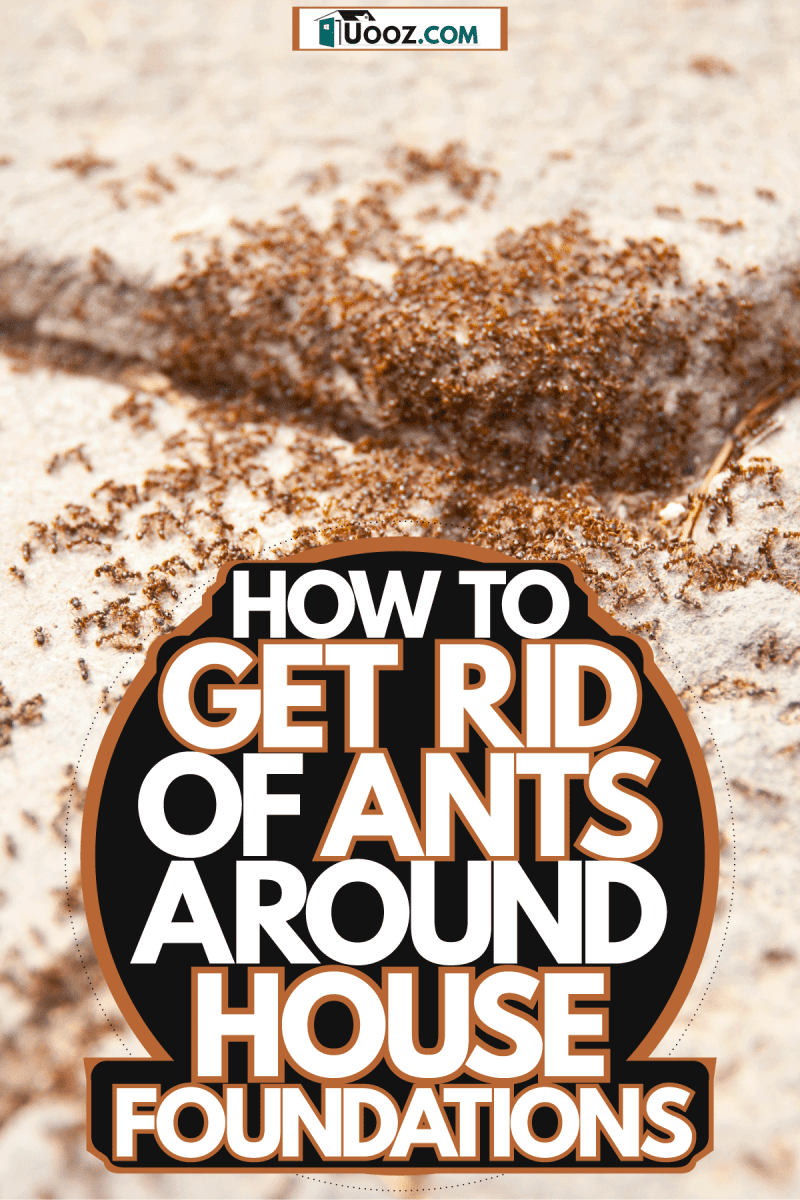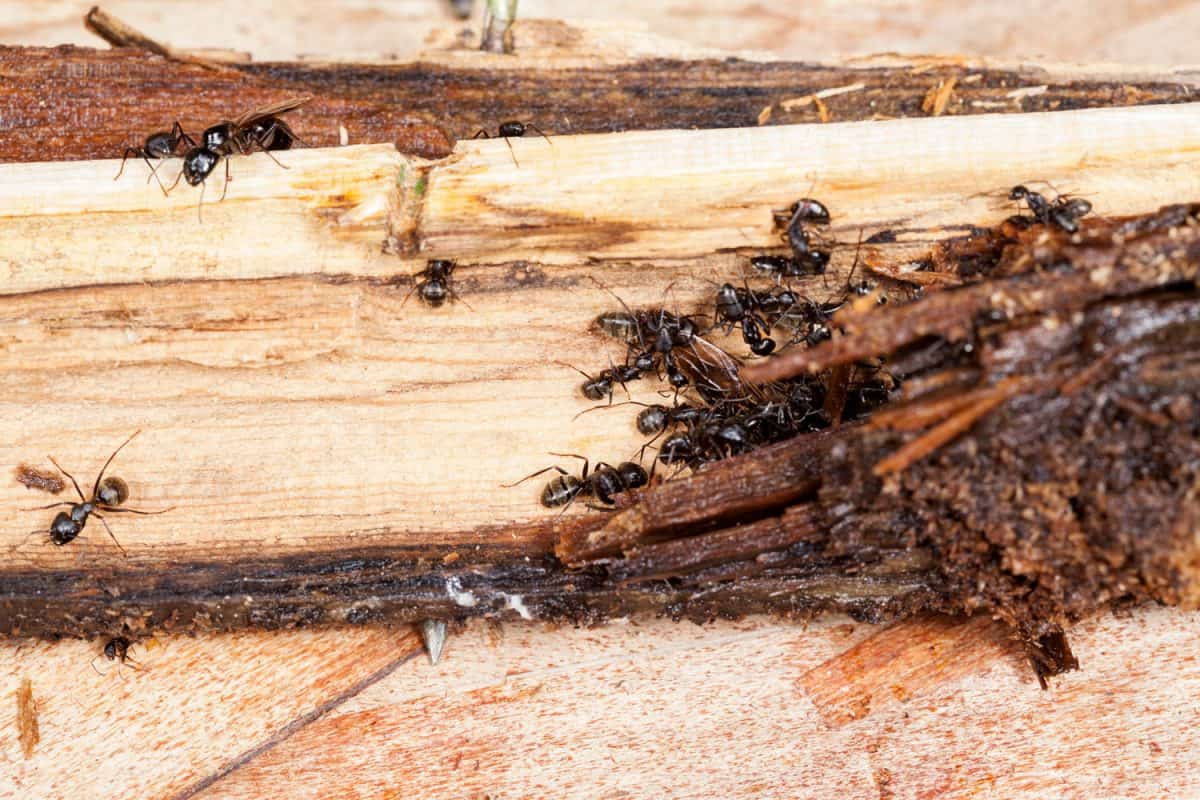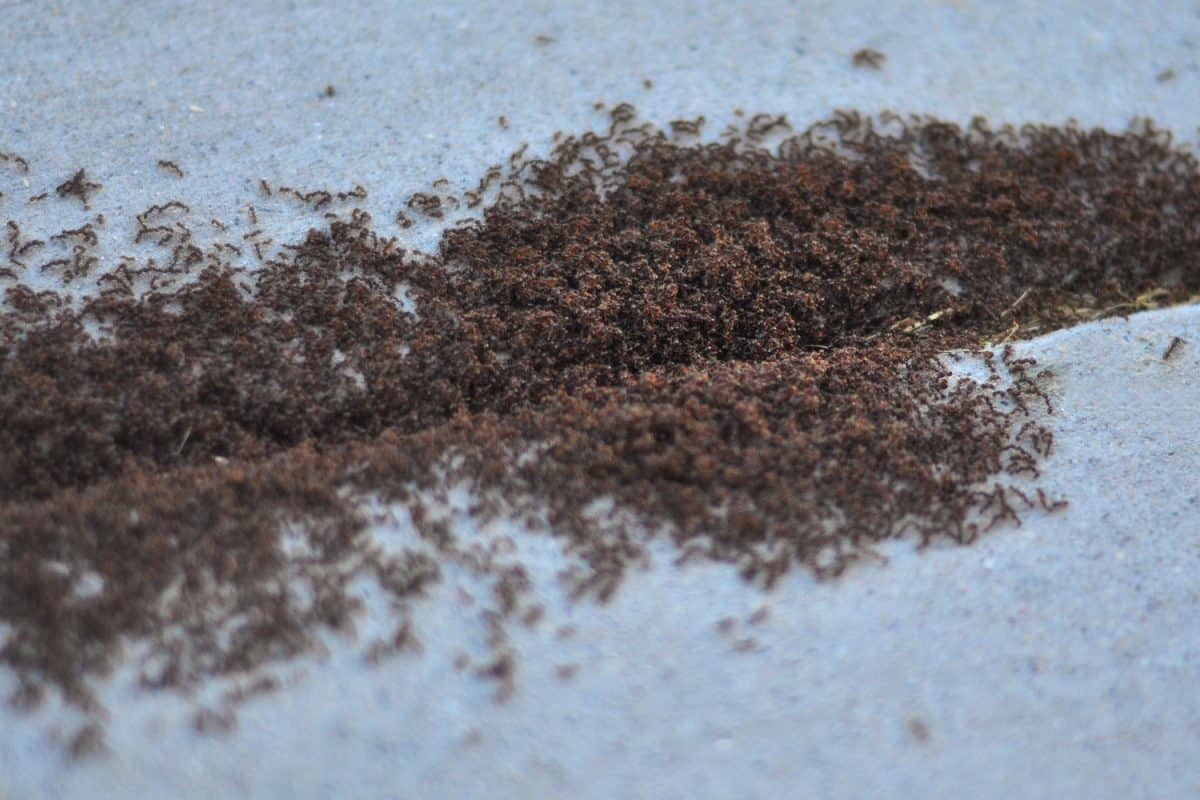Ants can find their way into your home through all kinds of places. One of those places might be the foundation of your house. So, if you're wondering how to get rid of those pesky critters, you've come to the right place. We've researched the topic in-depth and have some methods for you to try, so your foundation will be ant-free in no time.
To get rid of ants, you can try some common ant fighting methods, which include:
- Calling a professional
- Keeping shrubs, trees, and any other vegetation from touching the house
- Repairing any holes or cracks that might be allowing the ants into your home
- Putting out baits and traps
- Spraying the outside of your house with an insecticide
We've provided several methods for you to try in order to rid the area around your foundation of ants. However, you should keep reading as we elaborate on each method. We'll also answer some other questions you might have about ants around your home.

Contents
Are Ants Around Your Foundation Bad?
Depending on the type of ant around your foundation, they can be bad. Carpenter ants are the most likely to do damage because of the way they burrow into wood.
If they are left long enough, the damage to any wooden structure may be significant. Other negative effects of having ants around your foundation include ants finding their way into your kitchen or pantry, or even bites or stings if it is one of the more harmful ant species.
There are multiple species of ants, and some are more likely to make their way into your home than others. Either way, they can all find their way in through your home's foundation. While the general method of removing ants is the same regardless of species, some methods will work better than others depending on the type of ant you have around your home.
Types Of Ants You Might Encounter
Pavement ants and carpenter ants can cause structural damage, so these are the ants you least want to find in your home.
Carpenter Ants

Carpenter ants damage wood structures. Unlike termites, carpenter ants won't eat the wood but will instead burrow into it. This can be a problem if they are left undetected for a long period of time.
If you see one or two carpenter ants around your house, they might just be looking for food, and this isn't a cause for alarm. However, if you start seeing more than a few, you should try to find where they are coming from.
Pavement Ants
Pavements ant, as their name might suggest, like to live under concrete or rocks. They will often make their nests between cracks in concrete and nest under baseboards, edges of carpets, and insulation. This means they can wreak havoc on the inside of your home.

Can pavement ants cause structural damage?
Unlike carpenter ants, it is unlikely pavement ants will cause any significant structural damage. They nest underneath concrete or rocks, not inside it, so at most, a large nest might shift the concrete a little.
Other Ants
Most other species of ants you might find in your home won't cause any structural damage but can still be the cause of frustration. While some are harmless to humans, others can pack a pretty nasty bite or sting. Ants will always be attracted to sugary, sweet foods, so you might find them in your kitchen or pantry.
Ways To Eliminate The Ants
Thankfully, getting rid of ants can be done, and there are several methods for you to try. Let's discuss each one further below.
Call A Professional
If the idea of taking care of the ants alone is too much of a headache for you, you always have the option of calling a professional. A professional will be able to identify the type of ant you have and the best method of extermination. They will also be able to recommend tips for the prevention of future infestations.
However, the trade-off is that having a professional pest control company come out to your home can be pricey. For those of you who would like to try to tackle the problem yourself first, you can try some of our other recommended methods.
Removing Vegetation
Some ant species, like odorous house ants, will eat aphids. If you have a lot of plants and vegetation on the outside of your house that has an aphid infestation, you might find this is why the ants are attracted to that particular area.
If you have plants against your foundation, they might be providing an easy way into your home for the ants. Simply trimming back or removing the plants might solve your ant problem.
Repairing Ant Entryways
Ants obviously can't teleport through walls, but they are certainly small enough to fit into any cracks or crevices. The ants may just be taking advantage of some cracks or holes in your walls. Fixing and repairing these holes and thus taking away the ant's access to your home can help stop the ants in their tracks.
Baits and Traps
If all of the other methods have failed, it's time to try chemical warfare. Most ant colonies have a queen, but some, like pavement ants, have multiple. Ants that have multiple queens are called polygyne colonies.
These ants can be tricky to eradicate and can become a big colony very fast. In this example, the most effective method to get rid of ant colonies is to kill the queen or queens.
There are a number of ant baits available for purchase, but Terro ant baits are consistently recommended. You can place indoor ant bait traps inside your home if the ants have already made their way in.
Or, you can purchase outdoor traps to place around the foundation of your home to take care of them before they get a chance to enter your home. The ants will take the sweet-tasting poison back to their colony, providing an effective way to kill the entire colony.
Click here to see Terro Outside Ant Baits on Amazon.
Spraying The Outside Of Your House
Another method is to spray the outside of your home with an insecticide. This can be done by yourself, but it is also the likely method a pest control professional will use. Just be sure to follow all directions on the spray and any safety precautions. Spraying the perimeter of your home can also help deter and kill other pests such as cockroaches as well.
Many sprays will also offer protection for a period of time as well. Helping prevent ants and other pests from entering your home before they become a problem.
Click here to see Outdoor Bug Spray on Amazon.
Can ants eat through concrete?
Ants will sometimes burrow into concrete, but they do not technically eat through it. Also, ants that do burrow into concrete rarely cause any major damage, so it's unlikely you'll encounter anything too concerning.
Can ants build a nest in your house?
Yes, ants can build a nest in your house. Ants can build a nest in any type of space and are drawn to areas that might be high in moisture especially areas that might have rotten wood.
Carpenter ants or odorous house ants are the most likely to build a nest in your house. Carpenter ants can often be found nesting behind walls and in wooden foundations. However, occasionally, they might be found nesting behind cabinets or in appliances as well.
How do you find out where ants are coming from?
To find out where ants are coming from, you have to do a little detective work. To find ants outside your home you can look for areas that ants might typically nest, including any old piles of wood or debris. Other signs of ant nests include dirt piles where they have burrowed down.
Inside your home might be a little trickier. If you can't see a visible trail to follow, you may have to hunt for areas that ants might be. Ants are drawn to areas with high moisture, so check around any drains inside your bathroom or kitchen.
You can also do a test using honey to help find ants in your home. Check out this YouTube video which explains how to find ants that might be in your house:
Final Thoughts
Ants can be a real headache, but hopefully, our article has given you several methods to try to eradicate your ant problem. However, if you can't seem to get rid of them yourself, don't be too frustrated as some ant species are harder to get rid of than others. Remember, you can always call a professional. Good Luck!
For more reading regarding your home's foundation, check out some of our other blog posts:
How To Repair Cracks In The Foundation Of A House
How To Take Care Of Your House Foundation [A Complete Guide]


